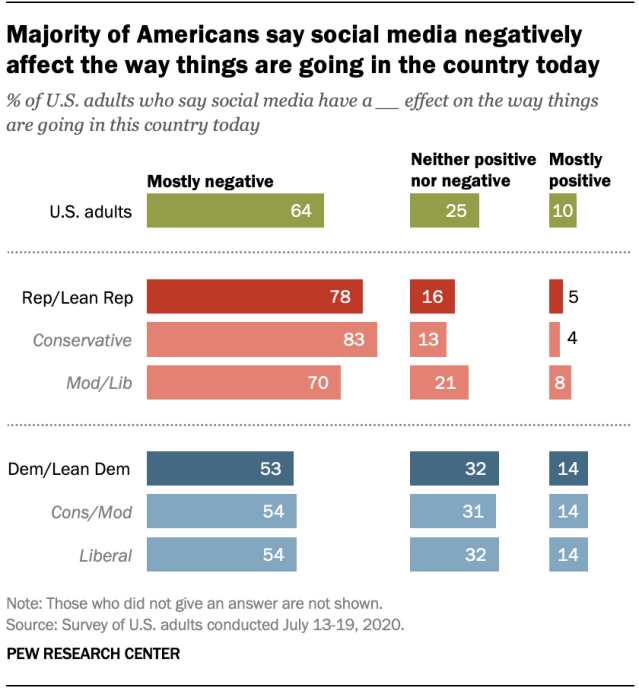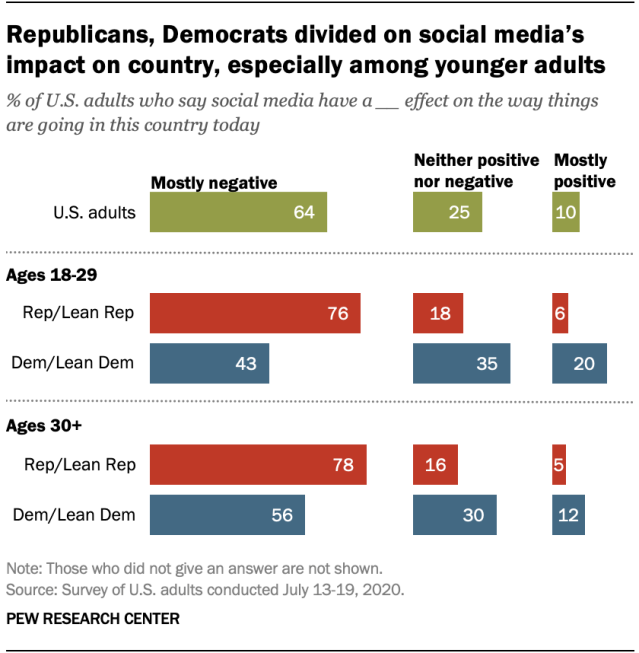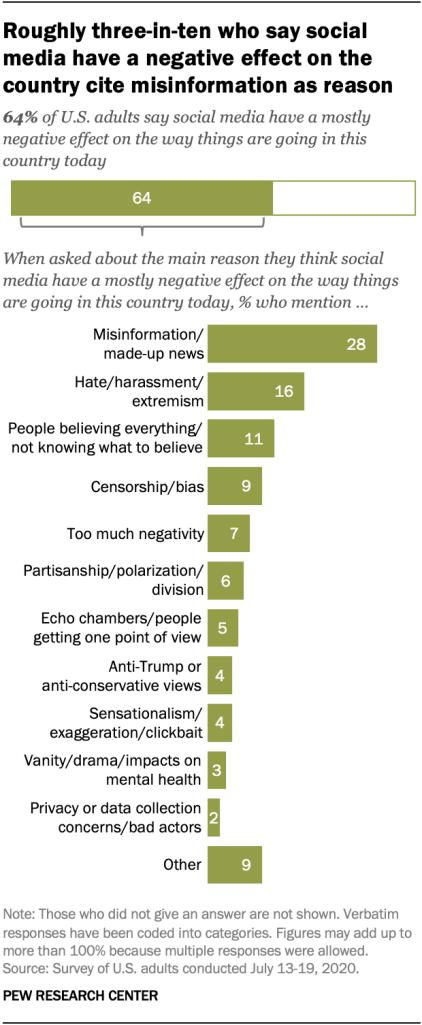Negative Statistics for Social Media
Almost two-thirds of Americans (64%) say social media have a mostly negative effect on the manner things are going in the state today, according to a Pew Research Center survey of U.S. adults conducted July thirteen-19, 2020. Just one-in-ten Americans say social media sites take a mostly positive effect on the way things are going, and one-quarter say these platforms have a neither positive nor negative effect.

Those who have a negative view of the affect of social media mention, in particular, misinformation and the hate and harassment they see on social media. They also take concerns about users believing everything they see or read – or not existence sure almost what to believe. Additionally, they bemoan social media'due south part in fomenting partisanship and polarization, the creation of echo chambers, and the perception that these platforms oppose President Donald Trump and conservatives.
This is part of a series of posts on Americans' experiences with and attitudes about the office of social media in politics today. Pew Research Eye conducted this study to understand how Americans think nearly the impact of social media on the way things are currently going in the country. To explore this, we surveyed 10,211 U.South. adults from July 13 to 19, 2020. Anybody who took part is a fellow member of the Middle'south American Trends Console (ATP), an online survey panel that is recruited through national, random sampling of residential addresses. This style nearly all U.S. adults have a take chances of option. The survey is weighted to exist representative of the U.South. developed population by gender, race, ethnicity, partisan amalgamation, didactics and other categories. Read more about the ATP's methodology.
Here are the questions used for this report, forth with responses, and its methodology.
The public'due south views on the positive and negative consequence of social media vary widely by political affiliation and credo. Across parties, larger shares describe social media's touch on equally mostly negative rather than mostly positive, but this belief is particularly widespread among Republicans.
Roughly half of Democrats and independents who lean toward the Autonomous Party (53%) say social media have a largely negative effect on the way things are going in the country today, compared with 78% of Republicans and leaners who say the same. Democrats are virtually three times as likely as Republicans to say these sites take a mostly positive impact (14% vs. 5%) and twice as likely to say social media have neither a positive nor negative event (32% vs. xvi%).
Amid Democrats, in that location are no differences in these views along ideological lines. Republicans, however, are slightly more divided by ideology. Conservative Republicans are more likely than moderate to liberal Republicans to say social media have a mostly negative effect (83% vs. 70%). Conversely, moderate to liberal Republicans are more than likely than their bourgeois counterparts to say social media take a mostly positive (8% vs. 4%) or neutral impact (21% vs. 13%).
Younger adults are more likely to say social media have a positive touch on on the way things are going in the land and are less likely to believe social media sites accept a negative impact compared with older Americans. For example, 15% of those ages 18 to 29 say social media have a generally positive result on the mode things are going in the country today, while just eight% of those over age thirty say the same. Americans 18 to 29 are also less likely than those 30 and older to say social media have a more often than not negative touch (54% vs. 67%).

However, views among younger adults vary widely by partisanship. For example, 43% of Democrats ages 18 to 29 say social media have a mostly negative outcome on the fashion things are going, compared with virtually three-quarters (76%) of Republicans in the aforementioned age group. In add-on, these youngest Democrats are more probable than their Republican counterparts to say social media platforms have a more often than not positive (20% vs. 6%) or neither a positive nor negative upshot (35% vs. eighteen%) on the manner things are going in the country today. This partisan partitioning persists amidst those xxx and older, but near of the gaps are smaller than those seen within the younger cohort.
Views on the negative impact of social media vary simply slightly between social media users (63%) and non-users (69%), with non-users existence slightly more likely to say these sites take a negative touch on. However, among social media users, those who say some or a lot of what they encounter on social media is related to politics are more probable than those who say a piddling or none of what they see on these sites is related to politics to think social media platforms have a mostly negative effect on the fashion things are going in the country today (65% vs. 50%).
By Pew Research Eye studies have fatigued attention to the complicated relationships Americans have with social media. In 2019, a Eye survey found that 72% of U.S. adults reported using at least one social media site. And while these platforms accept been used for political and social activism and engagement, they also enhance concerns amongst portions of the population. Some recall political ads on these sites are unacceptable, and many object to the style social media platforms have been weaponized to spread made-upwards news and engender online harassment. At the aforementioned time, a share of users credit something they saw on social media with changing their views virtually a political or social issue. And growing shares of Americans who use these sites also report feeling worn out by political posts and discussions on social media.
Those who say social media accept negative bear on cite concerns about misinformation, detest, censorship; those who see positive bear upon cite beingness informed

When asked to elaborate on the main reason why they remember social media have a more often than not negative issue on the manner things are going in this country today, roughly three-in-ten (28%) respondents who hold that view mention the spreading of misinformation and fabricated-upwards news. Smaller shares reference examples of hate, harassment, conflict and extremism (16%) as a main reason, and 11% mention a perceived lack of critical thinking skills among many users – voicing business most people who use these sites believing everything they see or read or being unsure about what to believe.
In written responses that mention misinformation or made-up news, a portion of adults ofttimes include references to the spread, speed and amount of false information bachelor on these platforms. (Responses are lightly edited for spelling, style and readability.) For case:
"They allow for the rampant spread of misinformation." –Man, 36
"Simulated data is spread at lightning speed – and fake information never seems to go away." –Adult female, 71
"Social media is rampant with misinformation both about the coronavirus and political and social issues, and the social media organizations exercise not do enough to combat this." –Woman, 26
"Too much misinformation and lies are promoted from unsubstantiated sources that lead people to disregard vetted and expert information." –Adult female, 64
People'south responses that centered around hate, harassment, conflict or extremism in some way oftentimes mention concerns that social media contributes to incivility online tied to anonymity, the spreading of hate-filled ideas or conspiracies, or the incitement of violence.
"People say incendiary, stupid and thoughtless things online with the perception of anonymity that they would never say to someone else in person." –Homo, 53
"Promotes hate and extreme views and in some cases violence." –Human being, 69
"People don't respect others' opinions. They take it personally and attempt to fight with the other grouping. You can't share your own thoughts on controversial topics without fearing someone will attempt to hurt you or your family unit." –Woman, 65
"Social media is where people go to say some of the almost hateful things they can imagine." –Human, 46
About one-in-ten responses talk most how people on social media can be hands confused and believe everything they see or read or are not certain about what to believe.
"People believe everything they see and don't verify its accuracy." –Human being, 75
"Many people can't distinguish between existent and fake news and data and share it without doing proper enquiry …" –Man, 32
"Y'all don't know what's false or real." –Man, 49
"It is difficult to discern truth." –Woman, eighty
"People cannot distinguish fact from opinion, nor can they critically evaluate sources. They tend to believe everything they read, and when they see contradictory information (peculiarly propaganda), they close down and don't announced to trust whatsoever data." –Human, 42
Smaller shares complain that the platforms censor content or permit material that is biased (9%), too negative (seven%) or too steeped in partisanship and division (half-dozen%).
"Social media is censoring views that are unlike than theirs. There is no longer liberty of speech." –Woman, 42
"It creates more divide between people with different viewpoints." –Man, 37
"Focus is on negativity and encouraging angry behavior rather than doing something to help people and brand the world better." –Woman, 66

Far fewer Americans – x% – say they believe social media has a generally positive effect on the way things are going in the country today. When those who hold these positive views were asked about the primary reason why they idea this, one-quarter say these sites assist people stay informed and aware (25%) and about one-in-ten say they let for communication, connexion and community-building (12%).
"We are at present enlightened of what's happening effectually the world due to the social media outlet." –Woman, 28
"Information technology brings sensation to important issues that touch on all Americans." –Man, threescore
"It brings people together; folks can see that at that place are others who share the aforementioned/similar experience, which is actually of import, especially when so many of u.s. are isolated." –Woman, 36
"Helps people stay connected and share experiences. I also get communication and recommendations via social media." –Human, 32
"It keeps people continued who might feel lonely and lone if in that location did not have social media …" – Man, 65
Smaller shares tout social media equally a place where marginalized people and groups take a voice (8%) and as a venue for activism and social movements (7%).
"Spreading activism and info and inspiring participation in Black Lives Matter." –Woman, 31
"It gives average people an opportunity to voice and share their opinions." –Man, 67
"Visibility – information technology has democratized admission and provided platforms for voices who accept been and continue to be oppressed." –Woman, 27
Notation: This is part of a series of blog posts leading upwards to the 2020 presidential ballot that explores the role of social media in politics today. Here are the questions used for this report, along with responses, and its methodology.
Brooke Auxier is a former inquiry associate focusing on net and technology at Pew Research Heart.
0 Response to "Negative Statistics for Social Media"
Post a Comment